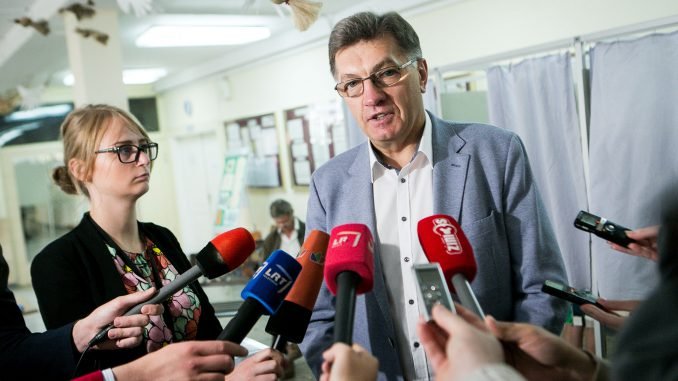
He also expressed regret over the fact that a lot of money has been spent on the vote, and politicians did not believe the necessary number of signatures to hold a referendum would be collected once its organizers started their collection.
“The turnout, I believe, will definitely be very low,” he said after casting his vote in Vilnius, asked by journalists whether, in his opinion, at least a half of voters would come to vote.
“The public wisdom will prevail. (…) We’ve adopted a law on safeguards, there are safeguards (for land sale – BNS), and there’s no need for politicizing in the area,” Butkevičius said.
The prime minister underlined that land prices dropped by a quarter during the preparations for the referendum. “Over the past two or three moths, land prices plummeted by around 25 percent,” he said.
The prime minister also said he came to vote to perform his civic duty. “I came to vote to perform my civic duty. At the end of the day, 300,000 signatures have been collected. And as prime minister, I must take into account the collected signatures and express my personal opinion,” Butkevičius said.
He also said that people voting in the referendum had been mislead during the agitation period when disinformation was being spread to make people come to vote. “A certain fear was being spread and that made people come,” the prime minister said.
Butkevičius once again reiterated that the referendum was organized for two reasons, including the EP and presidential elections and landowners’ plans.
“Other European countries had seen an in increase in Eurosceptic activity, and in some countries Eurosceptics even won the elections to the European Parliament. So who could deny the fact that people who own a lot of land in Lithuania was not the ones most interested in it (the referendum – BNS). They would just improve certain conditions for themselves with extended restrictions on land sale to foreigners so that they could have it even more,” the Lithuanian premier said.
Butkevičius noted that Lithuanian politicians did not believe the number of signatures needed to hold a referendum would be collected once its organizers started their collection. “Only after they saw that the signatures had been collected, politicians started to work more actively,” the prime minister said.
Figures from the Lithuanian Central Electoral Commission show that 62,200 people, or 2.46 percent of all eligible voters, have voted early in the referendum, which is almost three times fewer than during the early voting in the recent presidential elections.
12,500 have voted at municipalities and another 8,400 have cast their votes by post.
There are over 2.532 million people eligible to vote in Lithuania.
The referendum on constitutional amendments is being held after its initiative group collected 300,000 signatures in favour.
In Lithuania, for a referendum to be deemed valid, at least 50 percent of voters have to vote. The majority of experts expect, however, a considerably lower turnout.
Voters are being asked to express their approval or disapproval of the proposed ban to sell agricultural land to foreigners and legal entities. They are also being asked to lower the required number of signatures to hold a referendum to 100,000 signatures from existing 300,000.
Critics say, however, such a ban would breach Lithuania’s EU commitments.

Be the first to comment